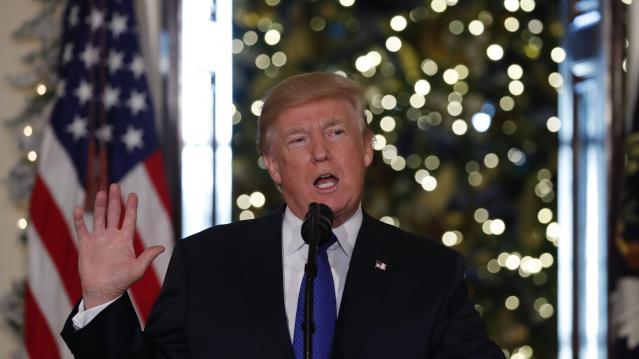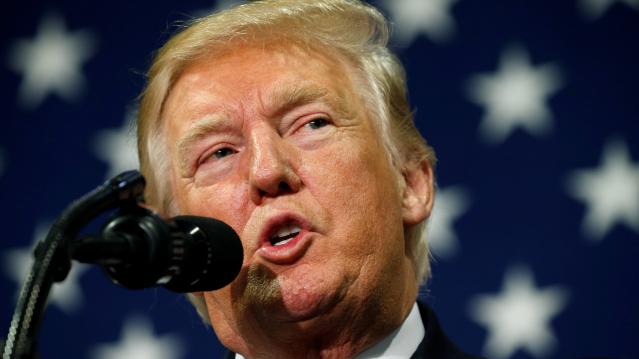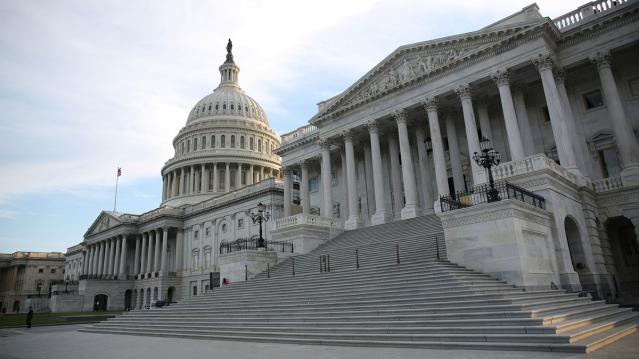Obama Faces Widespread Public Distrust on Iran Deal
President Obama will try to drum up support for the U.S.-Iran nuclear deal Wednesday afternoon at a news conference. But with widespread public disdain and distrust of Iran, Obama may have trouble convincing Americans of the wisdom of dealing with a long-time arch enemy in the Middle East.
The U.S. and Iran on Tuesday announced an agreement that would potentially block Iran’s development of a nuclear weapon for at least a decade while lifting international economic sanctions against Tehran. However, a new AP-GfK poll that was conducted just ahead of the announcement found that Americans only narrowly back diplomatic relations with the hardline Islamic government, and many want to see the sanctions kept in place.
Related: The 8 Most Important Things to Know About the Iran Nuclear Deal
Just 51 percent of those interviewed said the U.S. should have diplomatic relations with Iran while 45 percent said it shouldn’t. At the same time, 77 percent of those interviewed said the harsh U.S. and international economic sanctions against Iran should be preserved at current levels or even increased.
Only 12 percent of those interviewed thought sanctions should be decreased and seven percent said they should be eliminated altogether.
The public’s wariness and distrust of dating back to the 1979 Iranian revolution and U.S. hostage crisis matches the reception the nuclear agreement has received on Capitol Hill where most Republicans and some Democrats say they fear Obama has conceded too much to a country that has fomented terrorist activities throughout the Middle East and has repeatedly vowed to destroy Israel.
Fifty-six percent of Americans consider Iran to be an enemy, according to the poll conducted last Thursday through Monday, while an additional 31 percent consider Iran to be unfriendly but not an enemy. More than 70 percent of Republicans, half of all independents and 45 percent of Democrats described Iran as the enemy.
Related: Clinton Cautious in Her Praise of a Nuclear Deal She Helped to Orchestrate
Before the agreement was announced, six in ten Americans said they disapproved of Obama's handling of the U.S. relationship with Iran, while just over a third approved.
Obama is likely to prevail in pushing the nuclear non-proliferation agreement through Congress over the next two months, despite near-unanimous opposition from Senate Majority Leader Mitch McConnell, House Speaker John Boehner and other leaders and rank and file Republicans. Still, he will need to hold in place at least 34 of the 46 Democrats in the Senate to create a veto-proof firewall in the event Republicans push through a resolution of disapproval of the nuclear deal.
That means that Obama cannot afford any more than 12 Democratic defections to keep the agreement alive. Yesterday, Obama and Vice President Joe Biden began working the phones to shore up support on Capitol Hill, and the president will continue that effort during this afternoon’s White House press conference.
During an interview yesterday with Tom Friedman of The New York Times, Obama stressed that the deal prevented a pathway for Iran to develop a nuclear weapon while making it clear he shared Americans’ distrust of the Iranian government and had limited expectations of improved relations down the road.
Related: Iran Agrees to Limit Nuclear Weapon in Historic Deal
When announcing the deal yesterday, Obama said, “This deal is not built on trust -- it's built on verification…. We will, for the first time, be in a position to verify that Iran is meeting all of these commitments. International nuclear inspectors will have access to Iran's nuclear program -- where necessary, when necessary. This is the most comprehensive and intrusive verification regime that we have ever negotiated. If Iran tries to divert raw materials to covert facilities, inspectors will be able to access any suspicious locations.”
Can Trump Bring Democrats Along on Taxes?

Although Republicans are prepared to go it alone on tax reform, President Trump suggested creating a bipartisan working group on the topic during a Wednesday meeting with senators from both parties. Some senators were open to the idea, but it doesn’t look like Republicans have much interest in slowing down the process with in-depth negotiations. “I don’t really personally see the benefit of creating additional structure. I think we’ve got all the tools we need,” said Sen. John Cornyn (R-TX), who attended the meeting, according to Politico. Democrats appear skeptical, too. Sen. Ron Wyden (D-OR) said he told Trump that the distance between what Republicans were saying about their plan and what it actually does is a serious problem.
Where Trump Will Compromise on Tax Reform

White House officials tell USA Today’s Heidi Przybyla that President Trump will include a number of compromises to limit his tax plan’s benefits for the wealthy when he promotes the blueprint next month:
“The compromises will include ending a 23.8% preferential tax rate for hedge-fund managers, or the so-called carried interest rate, White House legislative affairs director Marc Short told USA TODAY. … Retaining parts of a state and local tax deduction that benefits many middle-class families in blue states is also an area where Trump is expecting compromise.”
Trump campaigned on raising the carried interest rate, saying its beneficiaries are “getting away with murder.” But changes to the carried interest rate may run into opposition from House Republicans, and the tweaks appear unlikely to win any Democratic support.
Larry Summers Savages Trump Tax Plan Analysis
Former Treasury Secretary Larry Summers made his distaste for the Trump administration’s tax framework clear last week when he said Republicans were using “made-up” claims about the plan and its effects. Summers expanded his criticism on Tuesday in a blog post that took aim at the report released Monday by the Council of Economic Advisers and chair Kevin Hassett, which seeks to justify the administration’s claim that its tax plan will result in a $4,000 pay raise for the average American family.
Never one to mince words, Summers says the CEA analysis is “some combination of dishonest, incompetent and absurd.” The pay raise figure is indefensible, since “there is no peer-reviewed support for his central claim that cutting the corporate tax rate from 35 to 20 percent would raise wages by $4000 per worker.” In the end, Summers says that “if a Ph.D student submitted the CEA analysis as a term paper in public finance, I would be hard pressed to give it a passing grade.”
One of the authors cited in the CEA paper also has some concerns. Harvard Business School professor Mihir Desai tweeted Tuesday that the CEA analysis “misinterprets” a 2007 paper he co-wrote on the dynamics of the corporate tax burden. Desai’s research has found a connection between business tax cuts and wage growth, but not as large as the CEA paper claims. “Cutting corporate taxes will help wages but exaggeration only serves to undercut the reasonableness of the core argument,” Desai wrote.
For Tax Reform, It May Be 2017 or Bust
National Economic Council Director Gary Cohn said Monday that tax reform has to happen this year, even if it means Congress has to stay in session longer. "I think we have a unique window in time right now, but unfortunately we keep losing days to this window,” he said. “The opportunity is now." House Speaker Paul Ryan said last week he’d keep members over Christmas if that’s what it takes. And Ryan predicted Monday that tax reform would pass the House by early next month and then get through the Senate to reach the president’s desk by the end of the year. But there are plenty of skeptics out there, given the hurdles. Issac Boltansky, an analyst at the investment bank Compass Point, told Business Insider, "The idea of getting tax reform done this year is a farcical fantasy. Lawmakers have neither the time nor the capacity to formulate and clear a tax reform package in 2017."
Do Republicans Have the Votes for the Next Step Toward Tax Reform?

Passing a budget resolution for 2018 through the Senate will open a procedural door to a $1.5 trillion tax cut over 10 years. The resolution is expected to reach the Senate floor this week, although there are questions about whether Republicans have the 50 votes they need to pass it. Sens. Susan Collins (R-ME) said this weekend that she would vote for it and Lisa Murkowski (R-AK) is likely a “yes” as well, but Sen. Rand Paul (R-TN) is reportedly a likely “no” and John McCain (R-AZ) appears questionable. Now it looks like Sen. Thad Cochran (R-MI) won't be back in Washington this week to vote on the resolution due to health problems. The Hill says Cochran’s absence puts tax reform “on knife’s edge.”
